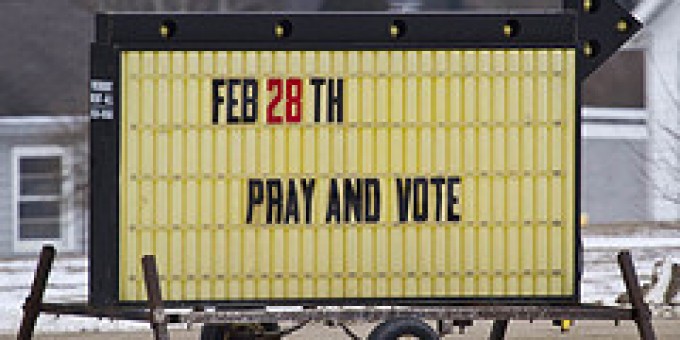
Wrangling over the proper nature of the connection between politics and religion has been persistent and passionate since the Puritans first arrived in the new world. On the surface, today’s division seems to be between a religious right and a secular left. It can also seem, especially from the point of view of the hyper-partisan political junkies of either side, that this division marks the difference between the sincere politicians who “get it” and those cynical ones who don’t.
In this election cycle, religion has really taken center stage in political rhetoric and political news. Following the collapse of Rick Perry and Michele Bachmann’s Republican bids, those still in the running for their party’s presidential nomination have been jockeying to become the voice of religious conservatives. As I write, Rick Santorum has largely locked down that position and has been testing how his message might play out in the general election. For instance, in an apparent reference to environmental issues, Santorum said that President Obama adheres to “some phony theology. Not a theology based on the Bible. A different theology.” On MSNBC, Santorum’s press secretary referred to Obama’s “radical Islamist policies” (she later said that she misspoke, while Santorum has added that if the President “says he’s a Christian, he’s a Christian”).
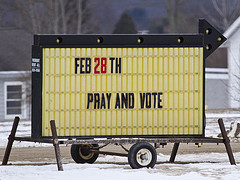
It’s tempting to chalk some of the current climate up to the depth of religious conviction among the current crop of candidates, at least on the Republican side. Some of the credit (or blame) must also go to the larger political forces that select those candidates, especially the convergence of highly motivated religious and political actors among the self-styled religious right. But while religious beliefs and convictions are certainly real and candidates and their supporters may well mean everything they say about religion’s role in political life, it turns out they couldn’t get away from the topic even if they wanted to.
A great deal of work in recent years examines the institutional and organizational dimensions of religion in public life. I want to focus on the cultural role of religion. Specifically, I want to point out three social functions that have kept religion relevant in all eras of American politics (even as we espouse the separation of church and state), and understanding these functions helps contextualize our current over-heated political climate. In a nutshell, religion acts as a marker of trust, as a source of national solidarity, and a symbolic boundary of inclusion and exclusion. All three help reinforce political legitimacy.
Religion as Symbolic Sincerity
In 1904, the well-known German social scientist Max Weber traveled to the United States, where he became particularly fascinated with the role of religion in American life. Weber later went on to write the most famous book in all of sociology, The Protestant Ethic and the Spirit of Capitalism. But during his visit, Weber also wrote a profound (but lesser known) essay called “The Protestant Sects and the Spirit of Capitalism” in which he attended to the symbolic and instrumental dimensions of religion.
He noticed that Americans always wanted, for instance, to proclaim their religious belonging in public settings. Why? Weber was no stranger to either public life or religion—his father was a German politician, his mother a devoutly religious woman, and Weber wrote a great deal about both politics and religion—but the public, political expression of religion in America baffled him.
“For some time in the United States a principled ‘separation of state and church’ has existed,” he wrote. Yet,
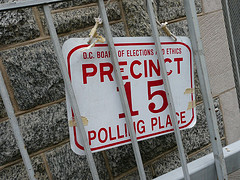
while Americans didn’t care much about denomination (at least compared with the more doctrinaire Germans), church membership functioned as a marker of respectability and trust in business and political affairs. Weber came to the conclusion that American congregations—especially for Methodists and Baptists—were essentially sects. Admission criteria for full membership in the congregation were high and served “as an absolute guarantee of the moral qualities of the gentleman.” In this way, “sect membership meant a certificate of moral qualification and especially of business morals for the individual.”
“Look at him… I told you so!” remarked a relative of Weber’s living in North Carolina, upon witnessing the baptism of a man one cold morning. The relative explained that the man wanted to open a bank in the nearby county seat and would likely outcompete his rivals on the basis of his acceptance into the Baptist church. Weber was equally impressed on his journeys further West, when a businessman on a train explained that “for my part everybody may believe or not just as he pleases; but if I saw a farmer or businessman not belonging to any church at all, I wouldn’t trust him with fifty cents. Why pay me, if he doesn’t believe in anything?”
Above all, 19th century American democracy was marked by a universalization of previously middle-class notions of respectability and belonging—the notion of community. And like the many community-based civic organizations of the time, religious organizations had a role to play in political life. “In the past and up to the present, it has been characteristic precisely of the specifically American democracy that it did not constitute a formless sand heap of individuals, but rather a buzzing complex of strictly exclusive, yet voluntary associations.”
Exclusive, yet voluntary—no such community comes without exclusions. Weber thought Americans, to an almost comic extent, were far more likely to deny distinctions of social standing and status than Germans. Even still, an insistence on equality of status and equal belonging required conformity of views and conformity of norms, and it required markers of belonging. Religion, as Weber and everyday people observed, served as an American shorthand for trustworthiness.
Religion as Symbolic Community
Weber’s point was that part of the American tendency to proclaim religious affiliation in public is instrumental. We can understand why politicians might talk about religion in the
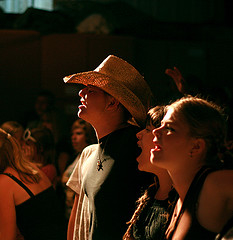
same way we can understand why plumbers might put a Christian fish symbol on their work vans—it says, “I belong to this community. They trust me, and you can trust me too.”
But that can’t be the whole story. For a start, religious language and expression pervades all levels of civic and political life, going far beyond local communities of belonging. Even when these “communities” are really rather large categories—Republicans or the middle class—most political candidates have to try to connect with an even broader public in order to be successful.
More importantly, religion is not just a one-way cultural transmission from the candidates to the rest of us. Part of why religious language is so entrenched in American politics is that Americans demand it; the political expression of religious belief (or expressions of political belief couched in religious language) is an American norm. So, because religion provides a common tradition and frame of reference, it can also provide a common language for belonging. It is a basis for solidarity in our otherwise divided society.
The sociologist Robert Bellah popularized the term “civil religion” in the 1960s to capture this idea (it initially came from philosopher Jean-Jacques Rousseau). In an ostensibly secular society, religion nevertheless plays an important role in political life: it works both on a literal religious level and as a kind of public ritual. We expect presidents to invoke God in the State of the Union and inaugural addresses, not only as an expression of personal piety but also as an invocation of a higher power behind public life. Further, we expect it as an invocation of a common cultural background against which our differences can be, at least theoretically, harmonized. From this perspective, political religion is the public version of church rituals; it is the way we call our national community into being.
But this only works if we are more than just a “sand pile” of individuals, as Weber put it. In some of Bellah’s later writing and in some recent work on the topic, the notion of civil religion has been called upon as a prescription as much as an explanation. What can bring us together in our increasingly polarized political climate and in our increasingly individualized civic life? If anything, perhaps civil religion, with its rhethoric of common belonging and its notion of American society as built on a covenant can serve as a link between individual will and national destiny.
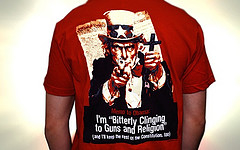
Of course, it is not just any kind of religious belief that signals belonging in this national “we.” It has been, and remains, specifically Christian belonging that “counts.” This itself is not eternal and unchanging: John Kennedy’s catholicism put him somewhat outside the mainstream in the early 60s, while as I write this, two of the top Republican candidates for president proudly proclaim their Catholic faith. In the same way, we have seen the increasing, if still partial, embrace of the wider “Judeo-Christian” tradition in public rhetoric.
But Christianity, in its broadest form, is expected and indeed enforced. In a national survey, Doug Hartmann, Penny Edgell, and I found that nearly 59 percent of Americans said that the United States was a “Christian country,” and said in a follow-up question that this was a positive thing. Another 17 percent said that it was not a Christian country, but it should be. Taken together, a majority of Americans held to this position across otherwise deep divides—rich and poor, black and white, Republican and Democrat. In the eyes of most Americans, being an American means being a Christian.
Religion as Symbolic Boundary
Religion, then, can operate as a marker of belonging in specific communities and it can function as a platform for American belonging more generally. At one level, these are inclusive functions. But if Christianity plays such a central role in Americans’ personal identities and in their understandings of the nation, why does religion seem to function in politics as a weapon as much as a common bond? The answer is that religion is a symbolic boundary, and like all boundaries, it both includes some and excludes others.
Some of this inclusion and exclusion works at a deep cultural level. It is often said that one can be almost anything, except an atheist, and still be president. While that may be an exaggeration, it is clear that belief is an expected part of American belonging (and, conversely, that nonbelievers do not belong). Opinion polls have long shown that atheists are at or near the bottom of the list of categories of people for whom Americans would be willing to choose as president. Similarly, nearly 40 percent of Americans told our research team that the degree to which atheists agree with “my view of American society” was “not at all.” Most surprising was the fact that nearly 20 percent of people who reported themselves as completely nonreligious answered this way as well.
As it turns out, exclusion is related to the symbolic sincerity explored above. “How can I trust someone who doesn’t believe in anything?” seems to be the way many people think about this. (And while atheists themselves presumably wouldn’t think that way, look again at the ironic response of the “nonreligious” toward atheists.)
Going further, the specifically Christian nature of national political life leads to other kinds of exclusion from the American “we,” despite the slowly expanding nature of that belonging. Next to atheists, Muslims are clearly the group most Americans think don’t really belong. Representative Keith Ellison of Minnesota became the first Muslim member of the U.S. Congress, causing not just discomfort but outright hostility from some parts of the polity.
Finer distinctions also become apparent. Catholics have clearly broken through the kind of exclusion they faced
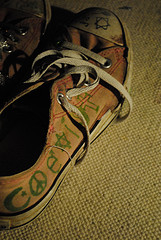
in prior decades; Rick Santorum and Newt Gingrich, both Catholics, seem to be acceptable candidates for most religious Republicans. But what about Mitt Romney? His Mormon faith has not, at least so far, been an overt issue in the campaign. However, it is not clear how much his relatively soft support is due to his personality, how much is due to his political positions, and how much to the fact that many are not sure about which side of the boundary Mormonism falls.
What Now for the Culture War?
But if we seem to be entering a particularly bloody religious skirmish in the American political culture war, there are also some reasons this war may be self-limiting. For one thing, recent decades of American history indicate a gradual but important expansion of the religious basis of the American “we”—from a narrowly Protestant understanding to one that includes Catholics and Jews, even if it still excludes Muslims and others. If we are not yet at a place where religious faith of any stripe is a marker of belonging, it seems that we are trending that way. The simple fact that the Judeo-Christian tradition has come to replace the Christian-only tradition so widely may mean that Americans will be unwilling to draw boundaries too strongly among believers for much longer.
This is not the first time in American history that populist politics (especially now in the Tea Party) have tracked the rise of religious distinctions in politics. At the turn of the 20th century, populism involved significant anti-Catholic and anti-Semitic views. The oddity of the current election is that those on the Republican side who are most willing to push religion as a political issue and castigate Democrats as “secularists,” are two Catholics and a Mormon, while the sitting Democratic president has long since been involved with a historically black Protestant church (one that was somewhat out of step with the mainstream in its own attention to worldly issues of race), but is frequently accused of being a secret Muslim. Even when formally separate, religion and politics have a way of overlapping in the American imagination.
For now at least, Romney is the front-runner in the Republican field. What would a fight between Romney and Obama look like, and how would that reconfigure religious boundaries? One relatively safe prediction is that an Obama/Romney election season would see fewer uses of religion as an electoral bludgeon than would a Santorum/Obama fight. Another somewhat safe prediction is that, while religion may be more or less obvious in the political debates to come, it will still function in the same ways as before.
As a broad generalization, Democratic and Republican politicians do tend to draw on religion in different ways; Democrats tend to see religion an important but essentially private matter, while Republicans tend to see it as public. But this is not exactly right, and certainly not when we are talking about the public at large. As the sociologist Christian Smith has pointed out, evangelical Christians are not a monolithic group. The high level of religious commitment of both Democrats and Republicans means effectively that religion is not likely to leave the public sphere. It also means that Americans may be wary any time it becomes too tightly connected to the profane world of partisan battles. As de Tocqueville observed long ago, the formal separation of church and state has served the interests of both religious and political institutions.
Recommended Reading
Gervais, W. M., A. F. Shariff, and A. Norenzayan. 2011. “Do you believe in atheists? Distrust is central to anti-atheist prejudice,” Journal of Personality and Social Psychology (101):1189-1206. One of the most recent examples of a wave of new social psychological on the social sources of anti-atheist sentiment in North American life.
Guth, James, John Green, Corwin Smith, and Lyman Kellstedt. 1994. “It’s the Culture, Stupid!” First Things, April. A now-classic piece about cultural coalitions in American electoral politics focusing on the 1992 Presidential election.
Sherkat, Darren. 2005. “Politics and Social Movements.” Pp. 1-18 in Handbook of Religion and Social Institutions, edited by Helen Rose Ebaugh. Springer Science. An expansive overview of social scientific research on religion and movements that emphasizes religion, including a section on religion and exclusion.
Smith, Christian. 2000. Christian America? What Evangelicals Really Want. Berkeley: University of California Press. A well-known study of American Evangelicals that proposes a subcultural identity theory of religious persistence in the modern world that highlights the cultural paradoxes of conservative Protestantism.
Wald, Kenneth D. and David C. Leege. 2010. “Mobilizing Religious Differences in American Politics.” Pp. 355-381 in Religion and Democracy in the United States: Danger or Opportunity? edited by Alan Wolfe and Ira Katznelson. American Political Science Association/Princeton University Press. A comprehensive and constructive synthesis of political science research in the area.
Weber, Max. 1904. “The Protestant Sects and the Spirit of Capitalism.” This classic essay focuses on the key symbolic and social functions of religious affiliations.

Comments 5
John Bilodeau — March 15, 2012
Do you make any distinction between rhetorical use of religious in politics and the social impact of that rhetoric?
Looking back at Obama's campaign or at other levels of government have you been finding these three functions?
Joseph Gerteis — March 19, 2012
I think you could -- Philip Gorski has an article on Obama and the notion of civil religion in the most recent edition of Political Power and Social Theory and does that much better than I could. I did write a comment on that article in the same volume, which is what got me thinking about this in the first place!
This is the info on Gorski's article and the comments:
http://people.bu.edu/juliango/ppst/Contents.html
Ashley — April 19, 2012
In Saudi Arabia, all citizens are eeruiqrd to be Muslims, and the public practice of other religions is forbidden. Private practice of other religions is sometimes allowed and sometimes persecuted; there is no law protecting even this.Iran is officially a Twelver Shiite state. Some other religions (Christianity, Judaism, Zoroastrianism) are permitted, but are not allowed to proselytize; and they are sometimes persecuted even if they don't. The Bahai faith is not allowed at all. Sunni Muslims are subject to some restrictions also.In China, all religious organizations have to be authorized by the government. This has given rise to conflict when the government appoints religious leaders different from what the religion itself chooses. There are state-appointed Catholic, Protestant, Buddhist, Taoist, and Muslim leaders. These are not always approved by the religious organizations outside of China. Those who practice religion outside these state-approved organizations are subject to severe persecution.In Turkey, since the secularization by Ataturk in the early 20th century, the government permits all religions but keeps them all under close surveillance. Special religious clothing (the veil, the fez) is not permitted to be worn in public. Turkey is predominantly Muslim, and there is some prejudice against other religions.In North Korea, virtually no religious practice is allowed except a limited amount by foreigners. Worship is considered a political offense.Cuba was for years officially atheist, and religious practice was seriously discouraged, with some persecution. But now religious people are even allowed to join the Communist Party. The government is secular rather than atheist, and religious practice is pretty much free.These are a few varied examples of governments which have restricted religious practice. In our time, the States that restrict religious freedom are mostly Muslim or Atheist.I can't think of any other belief system that does this in modern times.Religion is the source of meaning and values for many people, and restricting it restricts the growth of the human soul. In countries where a religion is imposed, it loses some of its growth potential. In countries where religion is not restricted or mandated by the government, it flourishes and leads to better values and ways of life.
Alfie — September 17, 2012
What's up to all, the contents present at this web page are truly amazing for people knowledge, well, keep up the good work fellows.
"Reason Rally" Reading - Discoveries — October 13, 2015
[…] and researched by a Minnesota team that included Joe Gerteis, author of the recent TSP White Paper on religion and American political culture, this widely cited study was among the first to document […]